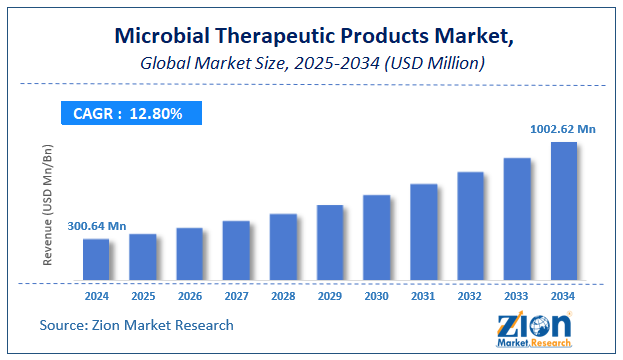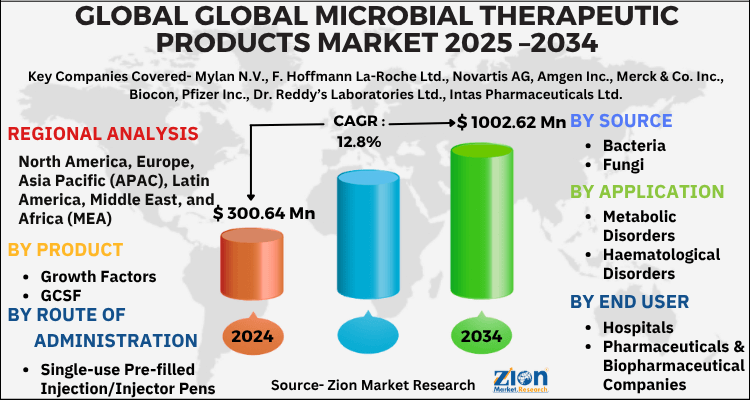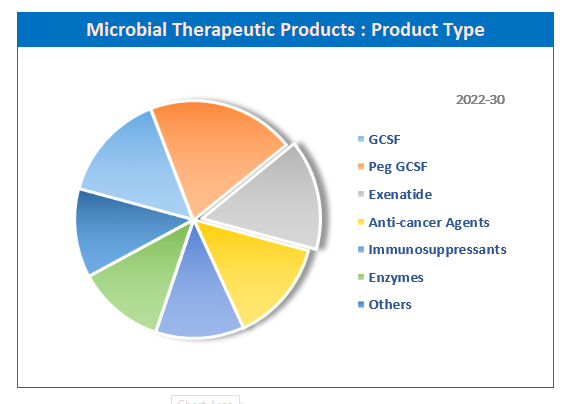Global Global Microbial Therapeutic Products Market Size, Share, Growth Analysis Report - Forecast 2034

Global Microbial Therapeutic Products Market By Product (Growth Factors, GCSF, Peg GCSF, Exenatide, Anti-cancer Agents, Immunosuppressants, Enzymes, Others), By Route of Administration (Single-use Pre-filled Injection/Injector Pens, Multi-use Injectors, Others), By Source (Bacteria, Fungi), By Application (Metabolic Disorders, Haematological Disorders, Oncology, Immunological Disorders, Infectious Diseases, Allergic Diseases, Others), By End User (Hospitals, Pharmaceuticals & Biopharmaceutical Companies, Research & Academic Institutions), and By Region: Global and Regional Industry Overview, Market Intelligence, Comprehensive Analysis, Historical Data, and Forecasts 2025 - 2034
| Market Size in 2024 | Market Forecast in 2034 | CAGR (in %) | Base Year |
|---|---|---|---|
| USD 300.64 Million | USD 1002.62 Million | 12.8% | 2024 |
Global Microbial Therapeutic Products Market: Industry Perspective
The global microbial therapeutic products market size was worth around USD 300.64 Million in 2024 and is predicted to grow to around USD 1002.62 Million by 2034 with a compound annual growth rate (CAGR) of roughly 12.8% between 2025 and 2034.
The report analyzes the global microbial therapeutic products market's drivers, restraints/challenges, and the effect they have on the demands during the projection period. In addition, the report explores emerging opportunities in the microbial therapeutic products industry.
Microbial Therapeutic Products Market: Overview
Microorganisms form microbial products, and the microbial manufacturing biotechnology industry is related to this area. These bacteria have been used for decades to make cheese, bread, vinegar, and wine, among many others. Medical microbiology includes enzymes, antibiotics, nutrients such as amino acids, vitamins, and organic acids, as well as vaccine production. The growing demand for healthcare nutrients such as vitamins, coupled with the increasing demand for diagnostic microbiology products, is expected to drive the market in the forecast years. At the same time, budget constraints of small and medium-sized market players hamper the market growth during the forecast period.
Key Insights
- As per the analysis shared by our research analyst, the global microbial therapeutic products market is estimated to grow annually at a CAGR of around 12.8% over the forecast period (2025-2034).
- Regarding revenue, the global microbial therapeutic products market size was valued at around USD 300.64 Million in 2024 and is projected to reach USD 1002.62 Million by 2034.
- The microbial therapeutic products market is projected to grow at a significant rate due to rising awareness of the importance of gut health and overall well-being, increasing prevalence of chronic diseases linked to microbiome dysbiosis, and growing advancements in microbiome research and genetic testing technologies, coupled with supportive regulatory frameworks and investment.
- Based on Product, the Growth Factors segment is expected to lead the global market.
- On the basis of Route of Administration, the Single-use Pre-filled Injection/Injector Pens segment is growing at a high rate and will continue to dominate the global market.
- Based on the Source, the Bacteria segment is projected to swipe the largest market share.
- By Application, the Metabolic Disorders segment is expected to dominate the global market.
- In terms of End User, the Hospitals segment is anticipated to command the largest market share.
- Based on region, North America is predicted to dominate the global market during the forecast period.
Microbial Therapeutic Products Market: Growth Drivers
The growing demand for healthcare nutrients aids the global market growth
According to analysts, the growing demand for healthcare nutrients such as vitamins and the increasing demand for diagnostic microbiology products is expected to drive the market in the forecast years. In addition, the rise of diseases such as cancer is expected to boost the industry in the coming years. Other factors expected to drive the global microbial therapeutic products market growth during the estimated period include enzyme production for end-use industries such as food preservation, leather, and paper. Several limitations and issues need to be overcome for the market to continue to grow.
Microbial Therapeutic Products Market: Restraints
The lack of accuracy may hamper the global market growth
The key restraints for the global microbial therapeutic products market are the lack of accurate information. Some aspects of specific microscopic organisms can be transferred to non-critical species, which poses a challenge in determining drug efficacy.
Microbial Therapeutic Products Market: Opportunities
The adoption of technology brings up several growth opportunities
Fermentation technology is the most widely applied method for producing microbial products that convert sugars into gases, alcohols, or acids. Increasing advances in fermentation technology can change the entire production process of microbial products. Usually, fermentation depends on using limited raw materials, and different bacterial strains have meager yields. But new recombinant technology is being used to manipulate the structure of microorganisms to increase their efficiency and make them capable of using various raw materials. Furthermore, by using these engineered microorganisms, the production of microbial products can be achieved more naturally and economically by introducing mutations into the organism. Pl plasmids and vectors for gene amplification are one of the modern advances in biotechnology to increase bacteria's productivity.
Microbial Therapeutic Products Market: Segmentation
The global microbial therapeutic products market is segmented based on Product, Route of Administration, Source, Application, End User, and region.
By source, the market is divided into bacteria and fungi. Among these, the microbial therapies derived from bacteria are expected to remain profitable as they are widely available from various sources. In addition, microorganisms perform the function of setting events and producing medicinal drugs, including anti-infective agents and nutrients. Given their harmless nature, the stomach microbiome has been a well-known source of refined bacteria over time. Gut bacteria are very beneficial in treating digestive problems and food poisoning.
By application, the market is bifurcated into metabolic disorders, hematological disorders, oncology, immunological disorders, infectious diseases, allergic diseases, and others. Over the forecast period, oncology and metabolic disorders are expected to account for a significant share of the global market. As indicated by research, Bacteriocin’s anti-infectives, chemicals, and peptides have great potential to provide drugs against malignant growth. Oncology seems to be the most promising candidate for future drug development.
Based on Product, the global microbial therapeutic products market is divided into Growth Factors, GCSF, Peg GCSF, Exenatide, Anti-cancer Agents, Immunosuppressants, Enzymes, Others.
On the basis of Route of Administration, the global microbial therapeutic products market is bifurcated into Single-use Pre-filled Injection/Injector Pens, Multi-use Injectors, Others.
By End User, the global Global Microbial Therapeutic Products market is divided into Hospitals, Pharmaceuticals & Biopharmaceutical Companies, Research & Academic Institutions.
Global Microbial Therapeutic Products Market: Report Scope
| Report Attributes | Report Details |
|---|---|
| Report Name | Global Microbial Therapeutic Products Market |
| Market Size in 2024 | USD 300.64 Million |
| Market Forecast in 2034 | USD 1002.62 Million |
| Growth Rate | CAGR of 12.8% |
| Number of Pages | PagesNO |
| Key Companies Covered | Mylan N.V., F. Hoffmann La-Roche Ltd., Novartis AG, Amgen Inc., Merck & Co. Inc., Biocon, Pfizer Inc., Dr. Reddy’s Laboratories Ltd., Intas Pharmaceuticals Ltd., Novo Nordisk A/S, Eli Lilly and Company, Sanofi S.A., Boehringer Ingelheim, Bristol-Myers Squibb Company, Abbot Laboratories, and others. |
| Segments Covered | By Product, By Route of Administration, By Source, By Application, By End User, and By Region |
| Regions Covered | North America, Europe, Asia Pacific (APAC), Latin America, The Middle East and Africa (MEA) |
| Base Year | 2024 |
| Historical Year | 2020 to 2024 |
| Forecast Year | 2025 to 2034 |
| Customization Scope | Avail customized purchase options to meet your exact research needs. Request For Customization |
Recent Developments
- November 2020 – Dr. Reddy’s Laboratory has announced a definitive agreement with Glenmark Pharmaceuticals Ltd. Acquired the anti-allergy brands Momat Rino, Momat Rino Advance, and Momat A to market them in Russia, Kazakhstan, and Uzbekistan, respectively.
- December 2020 – Novo Nordisk has announced the acquisition of Emisphere Technologies to exercise ownership of its Eligen SNAC oral delivery technology. The acquisition will accelerate the production of the GLP-1 receptor agonist, liraglutide, on a larger scale.
Microbial Therapeutic Products Market: Regional Landscape
The presence of market players and advancements help North America dominate the global market
North America is expected to be the dominant region in the global microbial therapeutic products market during the forecast period due to technological advances and increased industry research and development investment. Each year, the personal care industry in the United States reaches an increasingly high level of development. Women nationwide use 12 unique care products daily, while men use an average of six products daily. With more independent companies with shorter supply chains and greater resonance with younger customers, consumer spending has shifted primarily to skin care. Cosmetics are an essential component of the personal care business in the country, and some larger companies are having trouble complying with the definition of probiotics as living organisms in molded microbiological products.
Global Microbial Therapeutic Products Market: Competitive Analysis
The report provides a company market share analysis to give a broader overview of the key market players. In addition, the report also covers key strategic developments of the market, including acquisitions & mergers, new product launches, agreements, partnerships, collaborations & joint ventures, research & development, and regional expansion of major participants involved in the microbial therapeutic products market on a global and regional basis.
The global microbial therapeutic products market is dominated by players like:
- Mylan N.V.
- F. Hoffmann La-Roche Ltd.
- Novartis AG
- Amgen Inc.
- Merck & Co. Inc.
- Biocon
- Pfizer Inc.
- Dr. Reddy’s Laboratories Ltd.
- Intas Pharmaceuticals Ltd.
- Novo Nordisk A/S
- Eli Lilly and Company
- Sanofi S.A.
- Boehringer Ingelheim
- Bristol-Myers Squibb Company
- Abbot Laboratories
The global microbial therapeutic products market is segmented as follows;
By Product
- Growth Factors
- GCSF
- Peg GCSF
- Exenatide
- Anti-cancer Agents
- Immunosuppressants
- Enzymes
- Others
By Route of Administration
- Single-use Pre-filled Injection/Injector Pens
- Multi-use Injectors
- Others
By Source
- Bacteria
- Fungi
By Application
- Metabolic Disorders
- Haematological Disorders
- Oncology
- Immunological Disorders
- Infectious Diseases
- Allergic Diseases
- Others
By End User
- Hospitals
- Pharmaceuticals & Biopharmaceutical Companies
- Research & Academic Institutions
By Region
- North America
- The U.S.
- Canada
- Mexico
- Europe
- France
- The UK
- Spain
- Germany
- Italy
- Rest of Europe
- Asia Pacific
- China
- Japan
- India
- Australia
- South Korea
- Rest of Asia Pacific
- The Middle East & Africa
- Saudi Arabia
- UAE
- Egypt
- Kuwait
- South Africa
- Rest of the Middle East & Africa
- Latin America
- Brazil
- Argentina
- Rest of Latin America
Table Of Content
Methodology
FrequentlyAsked Questions
The global microbial therapeutic products market is expected to grow due to increasing antibiotic resistance, rising prevalence of chronic diseases, growing demand for personalized medicine, and expanding applications in oncology and immunology.
According to a study, the global microbial therapeutic products market size was worth around USD 300.64 Million in 2024 and is expected to reach USD 1002.62 Million by 2034.
The global microbial therapeutic products market is expected to grow at a CAGR of 12.8% during the forecast period.
North America is expected to dominate the microbial therapeutic products market over the forecast period.
Leading players in the global microbial therapeutic products market include Mylan N.V., F. Hoffmann La-Roche Ltd., Novartis AG, Amgen Inc., Merck & Co. Inc., Biocon, Pfizer Inc., Dr. Reddy’s Laboratories Ltd., Intas Pharmaceuticals Ltd., Novo Nordisk A/S, Eli Lilly and Company, Sanofi S.A., Boehringer Ingelheim, Bristol-Myers Squibb Company, Abbot Laboratories, among others.
The report explores crucial aspects of the microbial therapeutic products market, including a detailed discussion of existing growth factors and restraints, while also examining future growth opportunities and challenges that impact the market.
List of Contents
GlobalIndustry PerspectiveMicrobial Therapeutic Products OverviewKey InsightsMicrobial Therapeutic Products Growth DriversMicrobial Therapeutic Products RestraintsMicrobial Therapeutic Products OpportunitiesMicrobial Therapeutic Products SegmentationGlobalReport ScopeRecent DevelopmentsMicrobial Therapeutic Products Regional LandscapeGlobalCompetitive AnalysisThe global microbial therapeutic products market is segmented as follows;RelatedNews
HappyClients
Zion Market Research
Tel: +1 (302) 444-0166
USA/Canada Toll Free No.+1 (855) 465-4651
3rd Floor,
Mrunal Paradise, Opp Maharaja Hotel,
Pimple Gurav, Pune 411061,
Maharashtra, India
Phone No +91 7768 006 007, +91 7768 006 008
US OFFICE NO +1 (302) 444-0166
US/CAN TOLL FREE +1 (855) 465-4651
Email: sales@zionmarketresearch.com
We have secured system to process your transaction.
Our support available to help you 24 hours a day, five days a week.
Monday - Friday: 9AM - 6PM
Saturday - Sunday: Closed







